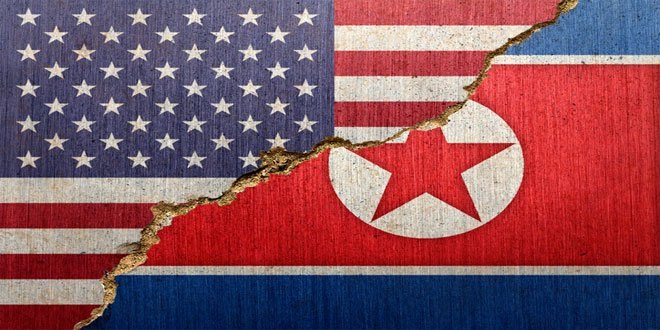Donald Trump is a politician who has always relished the dramatic, unexpected gesture.
None is more dramatic and unexpected than his announcement that he has accepted an invitation to meet Kim Jong-un, the North Korean leader, in the next few weeks. Those who believe, in Churchill’s famous phrase, that ‘jaw-jaw is better than war-war’, are hailing this bold move as a chance to resolve peacefully one of the world’s most dangerous stand-offs.
But more cautious figures, notably in the diplomatic world, are worried that a hasty and unprepared meeting between two such volatile and unpredictable leaders could make the situation very much worse and even lead to war. Few dispute that this is, at the very least, a big, big gamble. So should we be cheered or alarmed?
It was perhaps no surprise that when Donald Trump called in on the White House the morning after his astonishing and unexpected victory in the 2016 presidential election the incumbent president, Barack Obama, spent most of their meeting briefing him on what he regarded as the most urgent and intractable problem he would inherit: North Korea. Its secretive and highly repressive communist regime had defied world opinion and the diplomacy and economic pressure of successive American presidents to turn the impoverished country into a nuclear power that would soon claim to be able to threaten the western seaboard of the United States itself. Six nuclear and many long-range ballistic missile tests have got North Korea to the brink of that capability. It is a threat no American president can ignore and none have said they could tolerate.
President Trump’s response has been uncompromising. He has demanded the denuclearisation of the country, tightened even further the tight economic and trade sanctions already imposed on it and persuaded its increasingly exasperated patron, China, to do the same. Six months ago he threatened to rain ‘fire and fury like the world has never seen’ on North Korea if it failed to do so and he has consistently mocked Kim Jong-un as ‘little rocket man’. A diplomatic approach seemed off his agenda and only a few days ago Washington was pouring cold water on the idea that even the lowest-ranking American officials might start talking to the North Koreans. Military action, which would not only obliterate North Korea but threaten huge loss of life in South Korea, America’s ally, seemed far more likely.
It is South Korea’s alarm at this prospect that has precipitated the sudden change of outlook. The South Korean president, Moon Jae-in, used the opportunity of hosting the winter Olympics in January, to reach out to the north, which contributed athletes to a joint Korean team. Kim’s sister attended the games and President Moon sent envoys to meet President Kim and it was as a result of this initiative that the invitation to Mr Trump was made.
Kim said, in offering the meeting to the American President that he was ‘committed to denuclearisation’ and would halt any further tests pending the talks. Mr Trump has accepted and plans to meet him by May. No one yet knows where or exactly when but it will be the first time an American president has met a North Korean leader.
To many the prospect of such a meeting brings huge relief. It is always better to talk than to fight, they argue, and many believe that the sheer pressure that President Trump has brought to bear on the regime is now bearing fruit: he has forced it to the negotiating table and he will be able to use not only the threat of continuing to beat the stick but also the prospect of offering the carrot of economic assistance to persuade Kim to abandon his nuclear dreams. It will prove a vindication of Mr Trump’s tough approach.
But sceptics paint a different picture. They point out that the North Korean regime has never much worried about the severe hardship which economic sanctions have imposed on its people and remind the world that Kim has said repeatedly he would ‘never’ give up his country’s nuclear weapons. They add that in talking about a commitment to denuclearisation, the regime is referring not just to its own weapons but to the whole of the Korean peninsula, implying that Kim will demand that Mr Trump remove the protection of the American nuclear umbrella from South Korea. He will also probably demand the removal of the tens of thousands of American troops in the South. All this, they argue, would be far too big a price for Mr Trump to accept because it would leave South Korea vulnerable to conventional attack from the north. They add too that North Korea has always refused to allow inspectors into the country to verify any possible dismantling of its nuclear arsenal.
What worries many observers beyond these fundamental issues is the sheer unpreparedness of the Trump White House for such top-level negotiations to take place so soon. Few of the officials who were expert on North Korean affairs remain in place so that, as Bruce Klingner, a former such official in the CIA, put it: ‘we shall be flying by the seat of our pants’. Much, they fear, will be left to Mr Trump himself, a man who fancies himself an ace negotiator as a businessman but who has little experience in international diplomacy. And not a few are worried by the approach of the man himself. Professor Robert E Kelly of Busan University in South Korea, said: ‘Donald Trump doesn’t study or even read. He tends to fly wildly off script’.
Clearly, if Mr Trump succeeds in persuading Kim Jong-un to abandon his nuclear weapons he will have scored an enormous diplomatic and political success. But perhaps what most alarms the sceptics is that anything less will be viewed as failure and the diplomatic route to a resolution will have been prematurely exhausted to no end. To avoid humiliation President Trump might then feel he had no choice but to resort to the military option.
That outcome was hinted at by Republican Senator Lindsay Graham in a ‘word of warning’ he gave to President Kim when news of the impending meeting emerged. He said: ‘the worst possible thing you can do is meet President Trump and try to play him. If you do that, it will be the end of you and your regime’.
So does this announcement of a Trump/Kim meeting fill you with hope or with alarm?
Let us know what you think.











